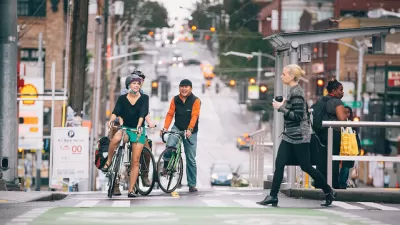Conservatives and libertarians who admonish government spending and transit subsides still support new road and highway construction, and the state power and funding they typically require.
Author and commentator Alex Marshall argues that the current pro-road position of many conservative and libertarian groups doesn't seem to match with their anti-government stance.
"The ancient Romans had a saying: To make a road straight, you need to make someone's neck crooked.
This chilling refrain is a vivid summing up of an obvious fact: Building a road is a manifestation of power, particularly state power. Carving a road across multiple jurisdictions and property lines - not to mention varying terrain - can be done only by an institution that can override the wishes of any one individual.
This was true in the days of the Roman Empire, when mighty roads were built so well that many of them still exist. And it's true today. In the exercise of that authority, local, state and federal governments spent more than $150 billion on roads in 2005, according to the most recent federal Highway Statistics report. That's comparable to what we spend annually on waging war in Iraq.
Given all this, I find it exceedingly strange that a group of conservative and libertarian-oriented think tanks - groups that argue for less government - have embraced highways and roads as a solution to traffic congestion and a general boon to living. In the same breath, they usually attack mass-transit spending, particularly on trains. They seem to see a highway as an expression of the free market and of American individualism, and a rail line as an example of government meddling and creeping socialism."
FULL STORY: King of the Road

Planetizen Federal Action Tracker
A weekly monitor of how Trump’s orders and actions are impacting planners and planning in America.

Map: Where Senate Republicans Want to Sell Your Public Lands
For public land advocates, the Senate Republicans’ proposal to sell millions of acres of public land in the West is “the biggest fight of their careers.”

Restaurant Patios Were a Pandemic Win — Why Were They so Hard to Keep?
Social distancing requirements and changes in travel patterns prompted cities to pilot new uses for street and sidewalk space. Then it got complicated.

DC Area County Eliminates Bus Fares
Montgomery County joins a growing trend of making transit free.

Platform Pilsner: Vancouver Transit Agency Releases... a Beer?
TransLink will receive a portion of every sale of the four-pack.

Toronto Weighs Cheaper Transit, Parking Hikes for Major Events
Special event rates would take effect during large festivals, sports games and concerts to ‘discourage driving, manage congestion and free up space for transit.”
Urban Design for Planners 1: Software Tools
This six-course series explores essential urban design concepts using open source software and equips planners with the tools they need to participate fully in the urban design process.
Planning for Universal Design
Learn the tools for implementing Universal Design in planning regulations.
Heyer Gruel & Associates PA
JM Goldson LLC
Custer County Colorado
City of Camden Redevelopment Agency
City of Astoria
Transportation Research & Education Center (TREC) at Portland State University
Camden Redevelopment Agency
City of Claremont
Municipality of Princeton (NJ)





























